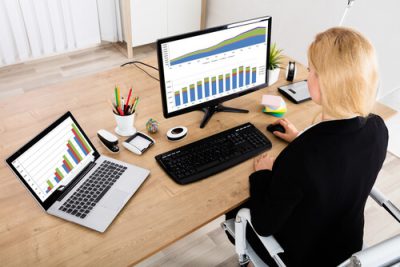Which Business Intelligence Software is Right for your Business?
For businesses operating in today’s modern climate, analytics has gone from a novel indulgence to a staple necessity. Businesses in every field and industry are realizing the benefits of an inspired implementation of business intelligence. Whether it’s a more accurate reading of their own data, improved forecasting, or an increased understanding of their industry; businesses have much to gain from implementing business intelligence (BI) programs. Your business is no different. But in the rapidly expanding industry of BI providers, which system or software should a decision-maker choose? Should you choose an established program or industry newcomer? Should you use Microsoft’s Power BI or Tableau?
First, it is important to remember that there is no single best BI program. Rather, the best system for your business depends on the unique characteristics and needs of your business. I hope that the information here is not seen as an endorsement of any specific BI software over another. Instead, these recommendations should be seen as a guide for decision-makers to understand which BI program would be best for them.
 What to Keep in Mind When Comparing Power BI vs Tableau
What to Keep in Mind When Comparing Power BI vs Tableau
To begin their journey towards the right BI software, every decision-maker should ask themselves several questions.
What am I looking for in software? Do I need an easy-to-use interface or vibrant visual graphics?
Why am I looking for BI software? Do I need to put a face on my data? Or do I need an intensive dissection of my information?
What about price? Am I looking for something inexpensive and low commitment, or am I willing to spend heavily for the right program?
Though myriad different BI software is available, I chose to compare Microsoft’s Power BI and Tableau. I made this choice in large part because they consist of two of the biggest and most well-known BI programs within the industry.But I also made the comparison because although the two programs have many similarities, they also have key differences that will help decision-makers filter their own decisions.
Tableau
Tableau holds many advantages over its BI rivals. One of which is in their ease of use. Tableau possesses a very intuitive and easy-to-understand user interface. Many BI programs are known for having a steep initial learning curve. It can be difficult for a first-time user to understand and make sense of the different data models. For Tableau though, their user interface allows even beginners to quickly understand their data.
Tableau could be a good choice for BI novices who don’t have the time to acquaint themselves with a complex interface. Along with a user-friendly display, Tableau also has impressive visual displays and data graphics. Furthermore, Tableau has comprehensive BI capabilities and a powerful, probing analytics engine.
They offer several significant advantages for users seeking a comprehensive probe of their data. Tableau allows for large data sets to be collected, along with an ability to slice data up by several different categories simultaneously. Tableau once even criticized their rival Microsoft’s Power BI for an inability to plot more than 3,500 data points at a time.
However, Tableau is not without its own faults. Tableau can slow down if especially large data sets are used. And Tableau’s pricing may turn off some buyers. But as a whole, Tableau is an excellent program with many great features. For users who want to truly understand their data, Tableau can be a great choice.
Microsoft’s Power BI
Our final program, Microsoft Power BI lacks some of the heavy computing power of its rivals. However, for what it lacks in power, Power BI makes up for in affordability and ability to integrate with other Windows programs. Power BI has very affordable options for users, including a free version that allows users to analyze up to a GB. Their Power BI Pro option still only runs up to $9.99 a month per user. For comparison, Tableau Desktop runs for $999 a year.
But Power BI’s lack of power in comparison to its rivals does not mean it is a weak program. Quite the contrary, Power BI has plenty of analytics abilities and computing punch. In fact, Power BI will be more than capable of handling most businesses ’ BI needs. For businesses who are looking for a BI program to help them understand their data, but aren’t looking for a program to break down every detail, Power BI could be the perfect choice.
Microsoft realizes that quite a few businesses fall within this category. After all, after Tableau criticized Microsoft for being unable to plot more than 3,500 data points, Microsoft retorted that Tableau would only be better for customers looking for “trivial data models”. Power BI also plugs in easily with Microsoft Office, perhaps making it the ideal choice for those already invested in using Microsoft products.
While Power BI loses out on the computing power or versatility of Tableau, that may only be temporary. Power BI continues to make great strides in its development and could challenge Tableau for long-term dominance of the BI market.
What’s Best for Your Business
The key to understanding which BI program is best for your business is to keep in mind the questions that were asked earlier. What are the specific needs of your business, and how will BI software help you to meet your goals?
There are times though, when it can be hard to gauge which program would be best for your business. In cases such as these, BI consultants can be incredibly helpful. BI consultants can assess and diagnose your particular situation to make suggestions that are honest and accurate.




